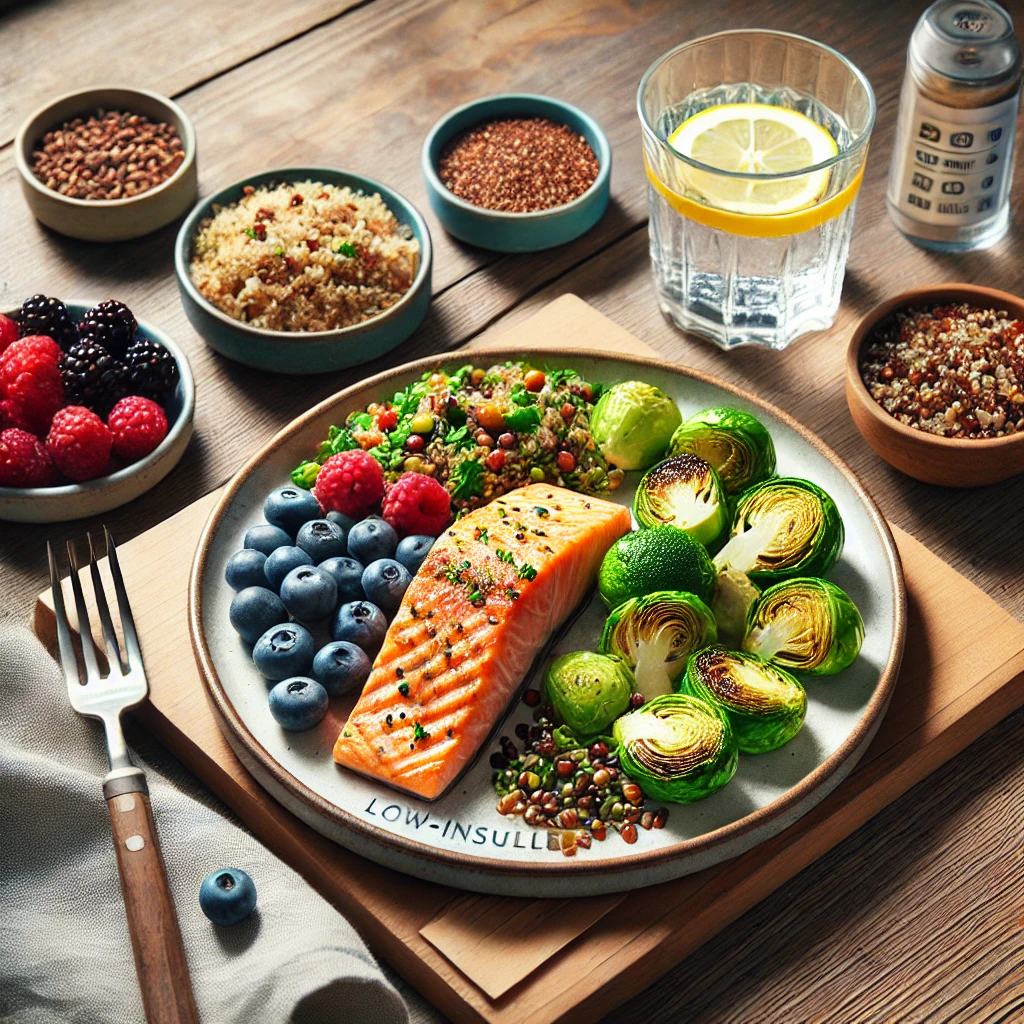
Introduction
The traditional ketogenic diet is famous for weight loss, but it’s not the only way to control insulin and shed pounds. A low-insulin diet focuses on stabilizing blood sugar levels and reducing insulin spikes, which can accelerate fat loss without extreme carb restriction. This article explores how to follow a low-insulin diet beyond keto, its benefits, and the best foods to include.
What Is a Low-Insulin Diet?
A low-insulin diet is designed to minimize insulin secretion by prioritizing foods that have a low glycemic index (GI) and promote stable blood sugar levels. Unlike keto, which heavily restricts carbs, a low-insulin diet allows moderate carbohydrate intake while focusing on fiber-rich, whole foods and avoiding insulin-spiking processed foods.
Benefits:
- Enhances Fat Burning – Lower insulin levels allow the body to access and burn stored fat more efficiently.
- Reduces Hunger & Cravings – Stable blood sugar prevents energy crashes and hunger spikes.
- Supports Metabolic Health – Helps improve insulin sensitivity and reduce the risk of type 2 diabetes.
- Allows More Food Flexibility – Unlike strict keto, you can include some healthy carbohydrates.
How It Differs from Keto
| Feature | Low-Insulin Diet | Keto Diet |
|---|---|---|
| Carb Intake | Moderate (50-100g/day) | Very Low (<20-50g/day) |
| Fat Intake | Moderate to High | Very High |
| Protein Intake | Moderate to High | Moderate |
| Food Flexibility | More diverse choices | Strict carb limits |
| Primary Focus | Insulin control | Ketosis & fat burning |
Best Foods for a Low-Insulin Diet
Protein Sources (Support satiety & muscle retention)
- Wild-caught fish (salmon, sardines)
- Grass-fed beef & free-range poultry
- Pasture-raised eggs
- Plant-based proteins (lentils, tempeh, tofu)
Healthy Fats (Reduce inflammation & stabilize blood sugar)
- Extra virgin olive oil & avocado oil
- Nuts & seeds (walnuts, flaxseeds, chia seeds)
- Fatty fish (mackerel, herring)
Low-Glycemic Carbs (Prevent insulin spikes)
- Leafy greens (spinach, kale, arugula)
- Cruciferous vegetables (broccoli, cauliflower, Brussels sprouts)
- Berries (blueberries, raspberries, strawberries)
- Whole grains (quinoa, farro, buckwheat – in moderation)
Foods to Avoid
- Refined Carbohydrates – White bread, pastries, sugary cereals
- Sugary Beverages – Soda, energy drinks, fruit juices
- Highly Processed Foods – Chips, fast food, frozen meals
- Artificial Sweeteners – Can still trigger insulin response in some individuals
Meal Plan Example (Beyond Keto)
Breakfast:
- Scrambled eggs with spinach & avocado
- Side of mixed berries
Lunch:
- Grilled salmon with roasted Brussels sprouts & quinoa
- Olive oil & lemon dressing
Snack:
- Handful of almonds & a piece of dark chocolate (85% cocoa or higher)
Dinner:
- Grass-fed beef with sautéed mushrooms & cauliflower mash
- Side of steamed asparagus
Low-Insulin Diet & Weight Loss Results
Many people see significant weight loss results within 2-4 weeks by adopting a low-insulin approach. This diet helps break insulin resistance, a key factor in stubborn belly fat storage. When combined with intermittent fasting (e.g., 16:8 method), fat loss can be accelerated even further.
Final Thoughts
A low-insulin diet provides a flexible, sustainable way to lose weight without extreme carb-cutting like keto. By focusing on whole, nutrient-dense foods, controlling processed sugar intake, and prioritizing healthy fats & proteins, you can improve metabolic health and long-term weight management.
Amyotrophic Lateral Sclerosis (ALS): Symptoms, Causes, Diagnosis, and Treatment
Leave a Reply